Hello, dear parents. Your child, who will soon be or has already turned 7 years old, has started school. Perhaps this is a specialized school with in-depth study of the English language. Or is it a simple school where they start learning English later. But you still think that 7 years is the age when it’s time to learn English.
The question arises: where to start learning English at 7 years old?
In the article you will find recommendations on how and where to start learning English.
1. Spoken English first
Many people mistakenly believe that they need to start with letters, then learn to read them and move on to reading words. This is fundamentally wrong. Think about the fact that before you start learning letters native language, your child learned to speak in a Russian-speaking environment. They usually move on to letters when the child can already express himself fluently in his native language. And at least pronounces all the basic sounds. You shouldn't start learning English from the alphabet.
2. Words and images.
Have you ever wondered why there are so many pictures in children's textbooks and books? This is not just done for beauty. Pictures and photographs carry images. The child thinks in images. Images help to process and remember new information as much as possible. Start learning English with simple description pictures. And only when English lexicon the child will grow significantly, move on to reading, and lastly, to writing.
3.Have fun
It is a well-known fact that children learn through play. English should be associated with joy, fun and play. You may feel like your lessons are turning into pampering. Of course, you need to control the process, but if you learn new words and sentences through play, using the child’s interest, and not through pressure and coercion, you will get good results in the form of knowledge acquired by your baby.
4. Good teacher
It is very important that the teacher and the student “get along in character,” so that the teacher teaches and the student learns. The child should have a good time in class. This means no nerves, raised voices, or humiliation. The teacher carries the image of the English language, because he is a guide to the world of English. If the teacher shouts and makes demands that are incomprehensible to the student, then your child is unlikely to have a desire to learn English further.
5. All at once?
Don’t expect your child to become a polyglot in just a few lessons. Even a year or two is not enough for this (exception if the child is in an English-speaking environment). It is known that a child learns his native language for 2-3 years (masters 70% of the vocabulary). If parents do not communicate in English at home, if people around do not speak English, then the process of learning the language stretches out for many years.
6. Create an environment.
This implies the following: create an English-speaking environment around the child. Let him play games in English, watch cartoons without translation, listen to fairy tales in English; Let your friends talk to the child in English (at a primitive level) when they meet. The environment provides information that the child’s brain processes. If there is no English-language information around, then the child, as they say, has nothing to learn and nowhere to apply the knowledge he has already acquired. Create daily contact with English. But don't overload your child. Half an hour, an hour - this is quite enough in combination with activities and games.
Website (500+ articles and lessons in English); ok-tests.ru (1000+ tests on all English grammar); Youtube CHANNEL OK English(600+ video lessons in English);
How earlier child starts to learn a foreign language, the better and faster his speech skills will be formed. When should you start exercising? It is believed that optimal age- 3 years. Previously, learning a second language with a child does not make sense, because he must first learn to speak his native language. Therefore, parents should be the first to engage with their child, and not wait until he goes to school. So let's look at how to teach a child English language from scratch.
Where to begin?You should study a foreign language with your child under the following conditions:
- the child has well-developed speech skills in his native language and has a sufficient vocabulary;
- there is an opportunity to study regularly;
- you can organize your study at game form so that the baby can study with pleasure.
How to teach your child English at home?
First, start by learning the words. Remember that children remember what interests them. What do kids like? Songs, poems and riddles. They tend to remember them well. Download audiobooks online for learning English with young children and listen to songs with him, then sing along together. During a walk, invite your child to sing a song as a memory, remind him what words are found in it and what they mean.
It is better to learn vocabulary while playing games. For example, by playing “mother-daughter” you can introduce your child to the traditions of England, as well as improve speech skills. First, introduce the child to the relatives of the English doll, tell him, for example, what fruits she likes, what clothes she prefers to wear, etc. This game is convenient because you can constantly come up with new thematic scenes: a doll at school, in a cafe, on a walk, with friends, etc. This will allow you to expand your child’s vocabulary in a relaxed and interesting way. Let the child repeat new words and phrases during the game, just make sure that the pronunciation is correct.
We list the main ways to teach your child English on your own:
- a joint game in which various everyday situations are played out;
- listening to songs, poems, riddles, counting rhymes and memorizing them;
- viewing children's books in English and discussing them;
- reading fairy tales;
- everyday conversations with a child in English.
But these tips are applicable for expanding your vocabulary and developing speaking skills.
How to teach a child to write in English?
This process requires perseverance and a more serious attitude from the child. In addition, the basis for written speech is oral. Therefore, if your child is 5 years old, he is ready to study for 20-25 minutes a day, and he already knows enough words in English, then you can begin to develop his writing skills.
First you need to learn how to write letters and their combinations. Then we explain how to write individual words that the child already uses in oral speech. It is important to connect associations here. For example, you need to remember the word kitten (kitten). With your child, draw an animal that holds the letters t in its two paws instead of mice. In the picture, write with your child an English word and its Russian version, repeat how it sounds orally. After some time, ask the child to write this lexeme without looking at the drawing. At a later stage, use various exercises to strengthen writing skills: write familiar three words together, and the child will separate them; Let the child fill in the missing letters in the words, etc.
How to teach your child English at home? Reading skills are developed together with writing skills or independently. The sequence is important here:

You, too, say the words out loud together with your child - this way he will better remember their correct pronunciation.
Thus, we looked at how to teach a child English without tutors. And remember that the main thing in your joint activities is regularity.
Your child has started learning English - at school, with a tutor, in courses. You feel that he needs to help, but you don’t know how - you yourself have never learned English. It's time to start doing this together! We will tell you how to effectively learn words, where you can listen to English speech and what books to read.
Parents often come to me with a question: how to help their child learn English? This is especially troubling for parents who have not studied the language themselves.
So, the first rule is to stop being afraid of an unfamiliar language, since this fear is passed on to children. Rule two is to believe in yourself and turn even short joint lessons into an exciting game. The main thing is that classes bring pleasure. I am sure that any parent, even those who do not speak a foreign language, can help their child learn a language by devoting no more than half an hour on a weekday and about an hour on a weekend.
Let's look at the block-by-block language teaching scheme, which is used in preparation for international English language exams, as well as in preparation for the Unified State Exam. Knowledge in the exams is tested in 4 skills: speaking, listening comprehension (listening), reading and writing.
Ability to speak
I believe that the most important thing in the ability to speak is vocabulary. Even if you don’t know grammatical rules, but having a large vocabulary, you can convey your thoughts to your interlocutor. Therefore, first of all you need learn words. To study words, I recommend making special cards. The list of words can be taken from a school textbook or, for example, on the website of the Cambridge University Examination Council, in the section corresponding to the current level. The very first level, for which children 8-11 years old can already take the exam, is called Young Learner Starters.
If you don’t have a lot of time, you can make cards by writing a word in Russian on one side and in English on the other. But if you set aside at least an hour a week and approach the issue creatively, you can turn the process of making cards into an element of learning and into interesting activity. How to do it?
For each word from the list, together with the student, find a picture on the Internet. Then you print out the finished sheet, and while you are cutting it into cards, ask the child to back side Write an English word for each picture. While you are preparing this manual together, he is already memorizing a large number of words.
It is better to carry out such preparation on one of the weekends. For a week you will need 20-30 words, that is, making cards will take no more than an hour. You will need to practice them 2-3 times a week.
There are several things to consider when learning words with flashcards. Firstly, there is no need to “cram” words. You lay out the cards with pictures (or Russian text) facing up. If the student remembers the word and names it correctly, you turn the card over with the English text facing up. If he doesn’t name it, then turn it over too, but put it in another pile. Then you do the same in the other direction (translating from English into Russian) until all the words in both directions are pronounced correctly.
The next time you study words (after a few days), you add 10 more cards to the old cards, thereby repeating previously learned words and mastering new ones. Gradually, well-learned words can be put aside and returned to them after 2-3 months.
Another option - make lotto. Create several game fields with pictures (say, 8 pictures per field) and cards with words in English. Two people can play this lotto. Thus, in one game you can learn up to 16 words.
If you do not know English and are not sure that the child pronounces the words correctly, then at the time of checking, you can sit down at the computer, open an online translator and listen to how the desired word sounds.
If you teach 2 times a week for 10 words, then in a month you can master 80-100 words. Of course, these words will not immediately enter the active vocabulary, but the required minimum - 350-400 words - is quite achievable. Namely, this is the number of words required for the basic vocabulary necessary for everyday communication. (For your information, it is believed that on average native speakers use from 3 to 5 thousand words.)
This exercise will require no more than 20 minutes a day(checked in an online translator - up to 30 minutes).

Letter in English
Once a week I recommend conducting a vocabulary dictation using the words you have learned. If you are not sure of your pronunciation, you can dictate a word in Russian and ask your child to write it in English, and then repeat the written words and check the pronunciation with a computer translator. You can also diversify the activities: invite your child to dictate words to you.
This usually takes no more than 10 minutes (20 minutes with verification).
Listening comprehension of English
To learn to perceive English speech, you need to listen to it. On the Internet you can find a huge number of cartoons in English. It’s better to start with simple English songs (nursery rhymes songs) - for example, “Old Macdonald had a farm”, “Mary had a little lamb”, “London bridge is falling down”, etc. You can find the lyrics of the songs through a search engine, and then , while watching stories with these songs on Youtube, invite the child to sing along with the characters, while holding the lyrics of the song in front of him.
At the very beginning of learning, it is better to master one verse at a time. Then gradually remove the text and ask the child to repeat without a piece of paper. If you don’t succeed right away, you can also find so-called ABC songs on Youtube. In these stories, the child sees and hears how individual words are pronounced, gets used to English speech. And besides, this will prepare him for reading, as it will allow him to remember what the letters are called and what sounds they convey.
This activity can be taken 2 times a week for 30 minutes.
Reading in English
Unfortunately, many modern children have problems reading not only in English, but also in Russian. First of all, the content of the book should be interesting to the child.
This should be adapted literature. Bookstores now sell a huge number of children's books in English for different levels of proficiency. For beginners learning a language, this is the Easystarts level. If the child has already mastered the initial stage, you can move on to books at the Beginner level. Usually at the end of the books there are tables showing the degree of complexity of the texts.
It is best to start with books by favorite authors, the content of which the child already knows in Russian.
One of the ways that children enjoy is reading and role-playing the story. You can even buy a collection of simple plays. For those parents who do not speak English, you can suggest the following: let the child help translate the parental role, so that the parent can then play it.
This can be done at a minimum 45 minutes once a week.
In this way, the daily learning process will turn into an exciting and useful time spent together. The English language will cease to be something unfamiliar and incomprehensible, but will become the language of games. In addition, parents who have never studied English before will also be able to master the initial level. It is only important that the classes be systematic.
Of course, learning English requires much more effort, but if you help your child overcome the initial stage and fall in love with English classes, this will be the key to successful learning in the future. So invent, invent and good luck to you.
Olga Rudakova,
educational psychologist
Author's article
Discussion
The title is "English with your child in 30 minutes a day." From the text “This exercise will take no more than 20 minutes a day” only for the first point. And there are four of them. Ha.
From the text “If you learn 10 words 2 times a week, then in a month you can master 80-100 words.” Are we talking about a child starting to learn English, or about an aspiring genius with a super memory? I have only two intelligent children with English lessons 4 hours a week at school and half an hour at home every day. They knew a hundred words by the end of second grade, i.e. in 20 months. I didn’t read further, I regretted my time.
Discussion
English is an analytical language, so there is nothing to do there until the age of 8-9. If you wish, you can start from scratch in 9th grade and enroll in a language university. On the other hand, learning anything early develops memory.
As a person who graduated from a good special school and the parent of a child who is currently studying there, I think that it is optimal to start learning a foreign language when you understand it with your native one. That is, he will speak well (without speech therapy problems), read and possibly write in his native language. This happened to my daughter and I when we were 6 years old. When I was a child, they started learning the language in a special school in the second grade, that is, at the age of 8. My daughter started preparatory school at school, i.e. with 6. I don’t understand why sponsor, it’s enough just to find a good school, especially since you are interested in the minimum basic level. If you find a more or less decent school, and the child does his homework!!!, there will be no blockages, you will reach that level. And just the other day I was talking with our class teacher, she is also a foreign language teacher, she once again confirmed what I have heard more than once. Only a few people have an inability to speak languages! The bulk of those supposedly incapable simply were not taught to learn the language. There are certain subtleties and differences in learning a foreign language and methodology. If they are not learned, it will be a constant attempt to break into open doors, there will be no result, there will be a classic case of “well, he’s not capable of languages.” Therefore, if you yourself do not know how to learn a foreign language, at the initial stage of training, I think it is simply necessary to take a tutor who will teach exactly this - the ability to learn a foreign language. This may take from several months to a couple of years (depending on the stubbornness of the child))). But the tutor should teach exactly this, and not run the program forward or stupidly do homework with the child. Then the child will learn on his own; a tutor will no longer be needed.
The rest dropped out.
English for children. Learning English - in courses. Please tell me English language courses in Moscow.
Discussion
I don’t understand why, excuse the expression, “cycle” on the so-called “media”? Do you really think that people for whom language is not their native language, but for whom language teaching is a profession, will not be able to teach the language to students at the proper level?! All these “carriers”, as a rule, are not professional teachers, but simply foreigners who came to Russia, some have a hobby, some have a girlfriend, some just decided to change the situation. They come for 2-3 months, then leave, why do you need such teachers?
I myself went to LL several years ago, and my friend went to another department of the same courses. Our joint conclusion is approximately this. Courses are like courses, completely typical with typical problems: constant change of teachers, dependence of the quality of education on the personality of the teacher, the overwhelming majority of teachers are foreign lovers of adventure and travel around different countries who are not professional teachers. I don’t know if there are cases where the same person among the teachers lasts there for more than six months or a year. The fact that the furnishings are shabby indicates their strong economy. I went to see them at the nearest secondary school, where in the evenings they taught in the most ordinary classes in which children studied during the day. Their program is also typical: it was on Headway.
In general, these courses are very similar to BKC, only they were a little cheaper. The positive thing about them is that the teachers are usually very pleasant, cheerful, and ready to communicate outside of the courses. For example, I once went out to drink beer with an Irish girl, we talked a lot and for free :) And a friend of my friend actually married a teacher from there and now lives in England. I learned English to the point of fluency :) My friend also became very proficient in the language with them, while they all communicated together in Russia outside of the courses. It also works in an English-speaking country now :)
Learning foreign languages. Adult education. Help me find an English tutor in the city. m. Yasenevo.
Pavel Burtovoy
Video designer of the St. Petersburg media channel “First Popular Television”. He is interested in cinema, animation and everything connected with it.
My son has been studying English at school for the second year. I recently discovered that his knowledge in this area is simply terrible. Problems were found even with the alphabet. Something had to be done.
For some reason, the method of memorizing words using double-sided cards did not work in our situation. Probably due to poor knowledge of the alphabet. I’m generally silent about different programs for smartphones: the child’s interest in learning a language is not zero, but rather negative, so that these programs can interest him.
I had to, based on the experience of my predecessors, develop and test my own method. Well, personally manage the learning process.
A little theory
Memorization can be reduced to a cyclical process of three components:
- Perception.
- Repetition.
- Testing.
When we want a child to remember information, the task becomes more complicated: it is not clear how well he perceived it, how many times he repeated it, and testing a student leads to stress and negative emotions in case of a bad result.
Let's look at all three components of the memorization process and how they can be improved.
Perception
For high-quality perception, it is desirable to use as many types of memory as possible: auditory, visual, motor. You can also add a variety such as verbal memory.
Repetition
When repeating material, oddly enough, effective method It turned out to be multiple recordings of the subjects being studied with their simultaneous pronunciation.
I read about this method in the memoirs of a Soviet intelligence officer. He called this technique the most effective for increasing vocabulary.
The effectiveness of the combination of repeated rewriting of words with their simultaneous pronunciation can be explained by the fact that all possible types of memory are involved in the process.
Rewriting allows you to automate the process and depersonalize it. In addition, recorded words document the fact of repetition and make it possible to find out which material is remembered better and which worse.
Testing
When testing knowledge, it would be good to hide the fact of testing from the child, but leave a reward for successful completion. That is, hide the stick, but stick out the carrot in every possible way.
If confirmed, the cycle of “perception - repetition - testing” is interrupted. If not, repeat. This creates an incentive to learn all the material faster.
At the same time, knowledge is acquired in portions and tested in portions, and not like this: “Sit down, now I will check how you learned what you were asked today.”
How the method works
Since my son didn’t know the alphabet very well, we started with that. I found the simplest recipes on the Internet, similar to these:
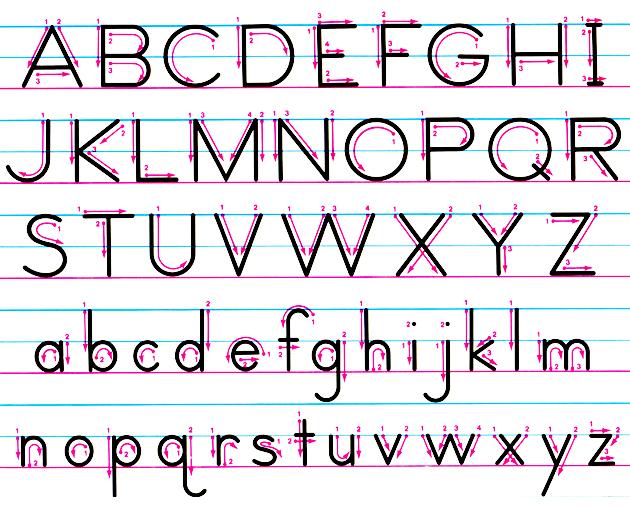
First, I got my son to completely associate the pronunciation of each letter with its spelling: this will be very important in the future. After the alphabet we moved on to words. To do this, I used and continue to use a regular student’s notebook with a line or sheets from such a notebook. In the margins I write the Russian meanings of the words (expressions) that are to be learned.
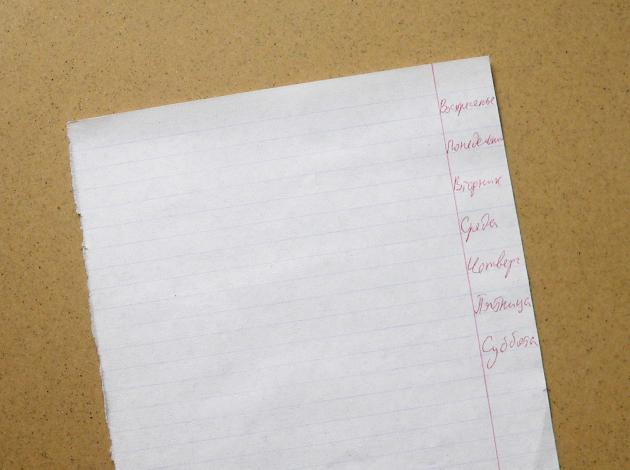
These words must be written on the appropriate lines. Since each word is new, I allow you to rewrite it from the textbook for the first time. Then the son writes the word as many times as will fit on the line.
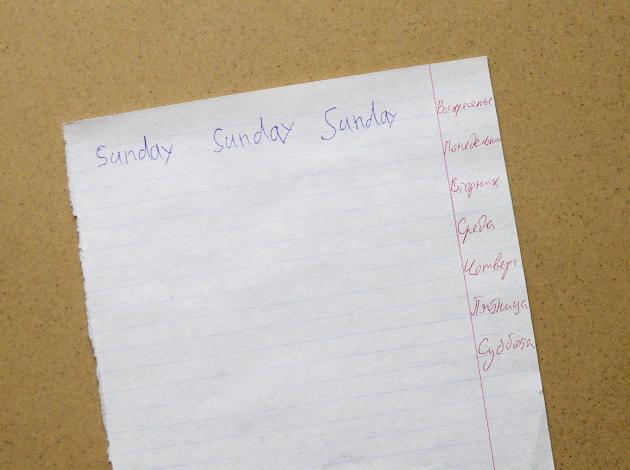
At the same time, he not only writes, but also pronounces the word out loud every time.
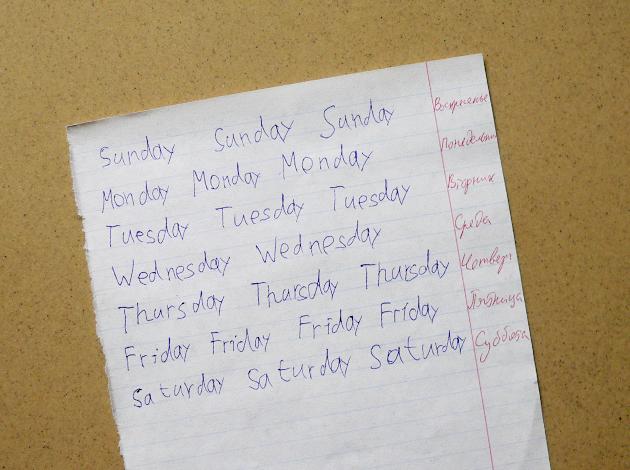
When finished, the sheet is turned over, and there is a surprise! In the margins are the same Russian words, and with their English counterparts you need to fill in all the lines, but without looking at the textbook.
Three important points:
- I care about the child, I don’t blame him for his mistakes.
- If he doesn't remember the spelling, then I spell it (that's where it comes in handy good knowledge alphabet).
- If a child wrote and pronounced a word without prompting the first time, then we have an agreement that he does not repeat it throughout the entire line. Subsequently, the word is removed from the lists. It is considered that it has been learned and the cycle of “perception - repetition - testing” is completed for it.
The process is repeated until all words from the original list have been eliminated. The photo below is about the fourth iteration.
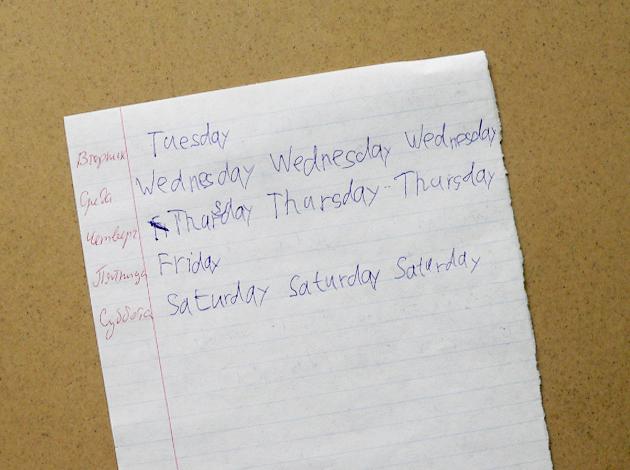
We previously taught our son the alphabet in the same way. I wrote “ey”, “bi”, “si”, “di” and so on in Russian in the margins, and my son filled in the lines with English capital and lowercase letters.
Pros and cons of the method
The method has several strengths. Almost all types of memory are involved: auditory, visual, verbal and motor. Learning is stress-free and the student does not suffer.
The rules of the game are simple and fair. We can say that the method works automatically and the result appears as if by itself. A clear demonstration of the dialectical principle of the transition from quantity to quality. The algorithm is applicable for repeating forgotten material and is easily scalable for different volumes of words.
The method gives the student objective criteria for achieving the goal. There are real incentives to learn everything quickly and go for a walk.
The disadvantages of this method of learning are also obvious: you need a lot of paper and a “supervisor”.
Spelling and pronunciation English names My son learned the days of the week in the evening. The next day I received test work five, praise and surprise of the teacher. And this is not the only success.
It was also interesting to observe how the material is, if it is not repeated. First of all, the ability to write without errors disappears, then pronunciation begins to suffer, and last of all, the sound of the word is forgotten. But the ability to recognize it in the text remains for a long time.
I don’t think that the method is ideal, but using the memorization mechanisms described, you can always come up with something of your own.
So, if you are reading this page, it means that you are serious about learning English with your child, and you are absolutely right choice! And now I will explain why. First, young children, unlike adults, have a unique ability to imitate the pronunciation of words and sounds that are new to them. Children learn quite easily through the process play activity, you played with your child for two to three weeks interactive games, and one fine day he told you instead of the usual: “With Good morning“Mom”, he will babble: “Good morning, mother!”. You may also need to review some of the basics of the English language, since children learn the language better through communication and joint games with adults. And the materials posted on the site will help you and your child overcome the language barrier in an entertaining and fun way, because it is - Entertaining English!
And before I tell you where to start learning English, let's figure it out: what age is most favorable for learning English with a child?. This question is most often asked by parents interested in a bright future for their child. Given the individual abilities and stage of development of each child, it is quite difficult to give a specific answer to this question. But most experts agree that English classes using this method can be taught to children aged 3 to 10 years. Up to 3 years it is pointless, and after 10 this technique will not give a positive result, since the child’s brain has a specialized ability to foreign language, which decreases significantly with age. The brain's speech mechanisms become less flexible and can no longer adapt to new conditions so easily. English is best learned at the age of 5 - 7 years, when the child has already mastered the system of his native language quite well. It is at this age that children assimilate the proposed language material without difficulty. It is at this age that the child can already be told about American holidays , this will help him better understand the culture, traditions and customs of the English-speaking population.
Well, now let's return to the topic of our conversation and figure it out, where to start learning English with your child. No need to force your child to cram english alphabet and remember English words. In order to motivate a child to expand his vocabulary, it is necessary to awaken his interest in the English language by learning with him simple poems, in which among familiar words and phrases there will be one or two words in English. For better perception, you can use toys and various objects so that the child has a more accurate idea of what is being said. Over time, using the same principle, you can begin to learn with your child counting rhymes, tongue twisters, songs And fairy tales. English is best learned using interactive games; for these purposes, you can arrange a puppet theater for your child or finger games. It is important that all English classes are fun and interesting, this facilitates understanding and increases the child’s interest in the language.
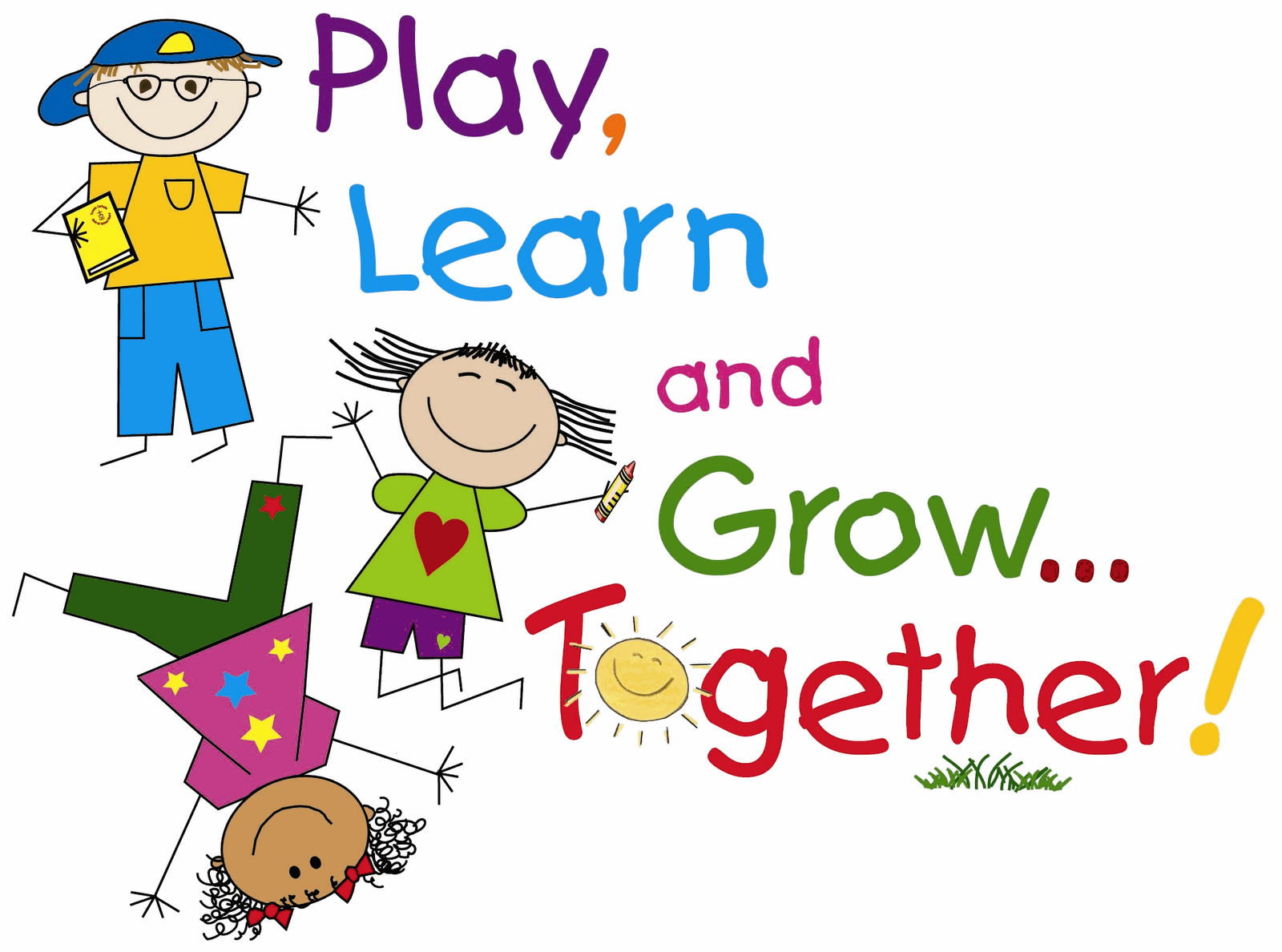
But don’t expect your child to immediately start repeating what you say. English phrases and words. Even in the process of children learning their native language, there is a “period of silence”, this is when the child watches and listens before he begins to speak. A similar period may exist in the study of the English language; children are already beginning to understand the meaning of what was said, but do not speak English. During this period, you should not force your child to repeat the English phrases and words you speak. Be patient, let your communication be one-sided during this period, and after a while, depending on the regularity of classes, each child begins to pronounce individual words or individual phrases heard earlier. Of course, the first English words will not be pronounced perfectly, but there is no need to focus the child’s attention on the mistakes made, just repeat correct option what he said. And remember that a child needs constant support and praise to effectively learn English. When conducting classes with children, parents lay down family tradition communicating with children in English, even if they have only an initial level of language proficiency.
Now you know what exactly you need to pay attention to Special attention, teaching your child English, and you can safely start learning, but do not forget that learning should take place in a fun and comic form, because that’s why he Entertaining English!
And the first step to achieving this goal will be



